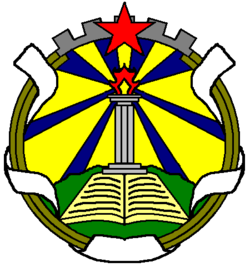Indokistan Armed Forces
This article refers to a micronation or element of micronationalism which is defunct and no longer exists. You can help make the article reflect that or ask on the talk page for further information. |
|
Indokistan Armed Forces | |
|---|---|

| |
| Motto: Securing and Protecting | |
| Established | January 2011 |
| Disbanded | April 2016 |
| March | Farewell of Slavianka |
| Country | |
| Branches | Ground forces Air and water forces Intelligence forces |
| Leadership | |
| Commander | Farhan Abbas as President of Indokistan (until 2016) |
| General information | |
| Headquarters | Teesbridge, Cussex |
| Active personnel | 10 |
Indokistan Armed Forces (Indonesian: Angkatan Bersenjata Indokistan) was a military forces of Indokistan that serves to protecting Indokistan from physical threats. It responsible for protection and security of entire Indokistani territories also with regions the government should take responsibility on its defence.
Since its establishment, the armed forces already in full deployment for few times, during January Revolution, Indokistan - Ntolian War, and during the tension between Indokistan and Nameless as the aftermath of Nameless Betrayal. After nearly 5 years of inactivity, the armed forces was disbanded in April 2016 as part of government institution simplification.
History
Badra Shidqi as advisor of defence at the time, suggests the communist government to form a military organisation to protecting the nation if there is a threat, and is agreed by the leader by issuing a decree to establishing a military organisation. Its day of establishment later celebrated as the "Military Day", which held every January 6.
Farhan Abbas has once raise an issue about the importance of the armed forces, as he said that the armend forces was barely useful, he also proposed a dissolution of it. The issue was taken on the referendum and failed to gain support from citizens, which made the armed forces to remain in existence.
On 13 April 2016, the National Forum finally agreed to disband the armed forces, with inactivity was blamed as the reason of its disbandment. Since there was no longer an organisation responsible on national defence and security, National Forum had agreed to make state government responsible on their own defence, and allowed them to establish local militia.
Commanding power
Commanding rights of the armed forces and entire of its personnel was on the full authority of the president after advice from national forum. The commander is responsible on declaring the deployment and retreat process of each personnels of the armed forces.
Components
Indokistan Armed Forces have 3 components inside it, which is the ground force (Angkatan darat), air and water forces (Angkatan laut dan udara), and an intelligence service named INTELIN.
Ground Forces
The ground forces is the oldest departement in the armed forces that established in January 2011 and the most busy one. The duty of the ground forces is to securing and protecting Indokistan lands and borders.
Water and Air Forces
This forces are establish in February 2011, after General Badra are considering that the sea and air security is important. The duty of this forces is to protecting and securing the air and waters of Indokistan, also its borders. Because Indokistan is a landlocked micronation, the water forces are deemed unimportant, and every training for the water forces was done entirely on inland waters.
Intelligence Agency
Intelligence agency of Indokistan was established on December 2011 after Ali Akbar suggestion for the government to establishing an intelligence service. This component investigates and observe information about intelligence, foreign affairs, defence and security objectives in Indokistan. INTELIN also held responsibilty to securing the national defence, alarming the government on the recent and potential threat for the nation, and to avoid any danger and actions against Indokistan.
Soldiers and Recruitment
Conscription is not observed in Indokistan, because the recruitment and membership of the armed forces is voluntary. Mass deployment (Pertempuran Semesta) instead observed when the government decides to declare the status of emergency during an critical situation thay may ended in physical conflict. During the deployment, beside full deployment of military personnels, government encourage civilians to join defending the nation.